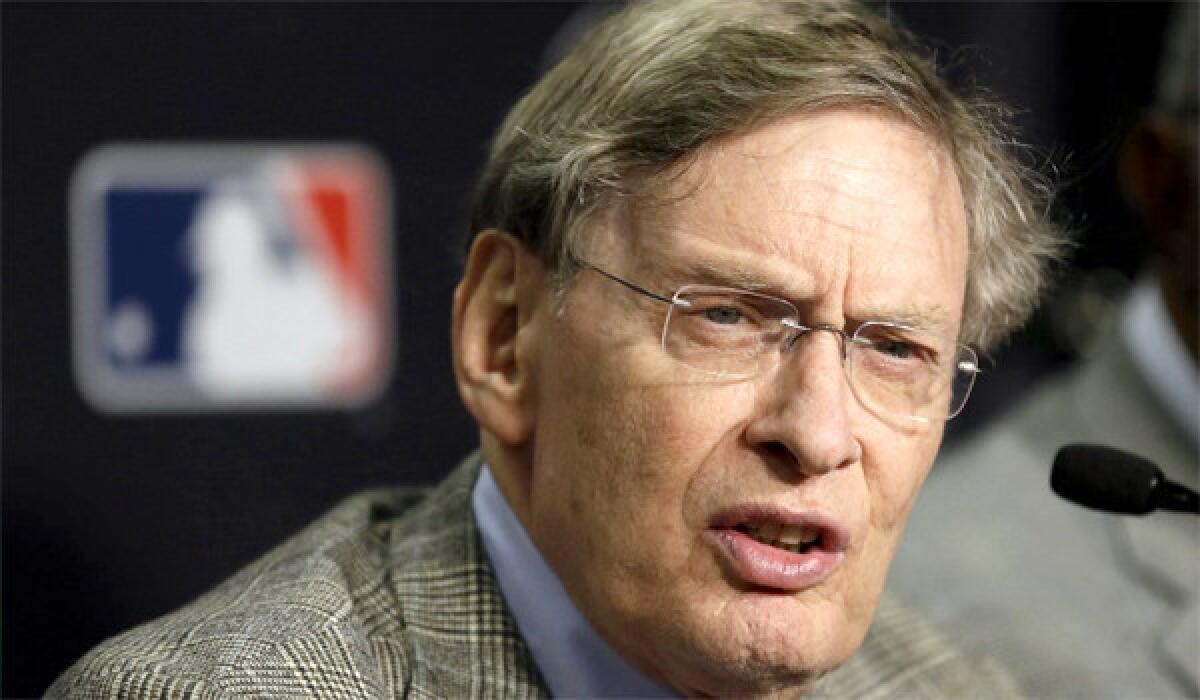Baseball earns praise for drug policy

This could be the drug-testing equivalent of a home run trot for Major League Baseball.
More than a dozen players, including the game’s active home run leader, Alex Rodriguez, reportedly are set to be suspended for violations of the sport’s drug policy. The recent suspension of 2011 most valuable player Ryan Braun for the rest of this season has already won hearty applause by anti-doping leaders.
MLB does a superior job in confronting performance-enhancing drugs compared to the nation’s three other major pro sports leagues, anti-doping experts say. Baseball conducted more than 5,000 urine and blood drug tests last year, and has its own team of investigators to partner with law enforcement to pursue drug-violation leads like those in the Biogenesis case.
PHOTOS: Notable players suspended by Major League Baseball
“Baseball, with Congress looking at them and the public-health ramifications, had a lot to lose before it advanced,” said Dr. Gary Wadler, professor of medicine at Hofstra North Shore-LIJ School of Medicine and a former official with the World Anti-Doping Agency.
Wadler previously assailed MLB Commissioner Bud Selig for being slow to act as baseball’s biggest stars, including Barry Bonds, Sammy Sosa and Mark McGwire, broke home run records. Their reputations later were tarnished with links to PED use.
“But Selig became passionate about this,” Wadler said. “Doping was harming his legacy, he did something about it — to the point that the other sports are crawling in the right direction but need to speed up to get where baseball is now.”
MLB regularly conducts blood tests on players to target the use of human growth hormone, which boosts strength and speeds recovery after workouts. The sport also beefed up its list of banned supplements, including the amphetamine Oxilofrine for which Jamaican track stars Asafa Powell and Sherone Simpson were recently busted.
Baseball is the only major league to employ the sophisticated carbon isotope ratio test ($400 per procedure) to identify synthetic testosterone in urine. This year MLB also launched Olympics-style “biological passport” testing to monitor an athlete’s urine and blood tests over time to help detect changes that indicate doping.
The NFL is considered by most anti-doping experts to be a distant second to MLB in drug policy effectiveness. Football is in the early stages of testing for HGH and is collecting players’ blood samples to establish the threshold level for a positive test.
U.S. Anti-Doping Agency head Travis Tygart, whose work resulted in the stripping of cyclist Lance Armstrong’s seven Tour de France titles, has testified that the “gold standard” of testing plans is the WADA Code.
Some 593 sports organizations worldwide follow the code, including international track and field, swimming, soccer and skiing bodies. Yet, clean-sport advocates are concerned because the various organizations use wildly different testing schedules.
For instance, Jamaica’s Anti-Doping Commission conducted only 106 drug tests (68 out of competition) last year — compared with 4,051 by USADA and 10,066 tests in China, according to a recent WADA report.
Off-season testing can catch athletes off guard during the doping season. But that is not done enough, said Victor Conte, founder of the infamous PED-supplier Bay Area Laboratory Co-Operative, which counted home run king Bonds and Olympic champion Marion Jones as customers.
“They did 6,000 tests of 14,000 athletes at the [2012 London] Olympics and caught six people,” Conte said. Testers “are throwing their line in the pond when fish aren’t biting. They need to go to Jamaica and Russia and wherever else there’s reason to target high-performing athletes and test them in the off-season.”
Ultimately, most sports organizations rely on their own self-policing in drug tests.
The NCAA conducted nearly 5,000 random urine tests of football players last season and had 45 test positive for drugs, but it doesn’t do out-of-competition testing or any blood tests.
“We think being clear about our policy — that if you’re caught cheating, you lose one calendar year of eligibility — increases deterrence,” said Mary Wilfert, the NCAA’s associate director of health and safety.
But Conte said the NCAA drug-testing policy is lax and can be easily beaten by athletes taking fast-clearing testosterone candies called troches, which came to light in the Biogenesis probe. The NCAA considers a testosterone test positive when the ratio of synthetic testosterone to a body’s own testosterone is 6:1 — higher than the WADA-mandated 4:1 ratio.
“The door to the barn is wide open for NCAA athletes to use synthetic testosterone,” Conte said.
Twitter: @latimespugmire
More to Read
Go beyond the scoreboard
Get the latest on L.A.'s teams in the daily Sports Report newsletter.
You may occasionally receive promotional content from the Los Angeles Times.











